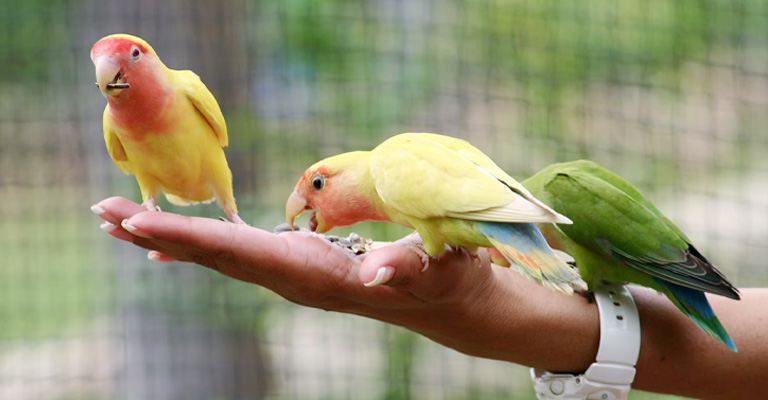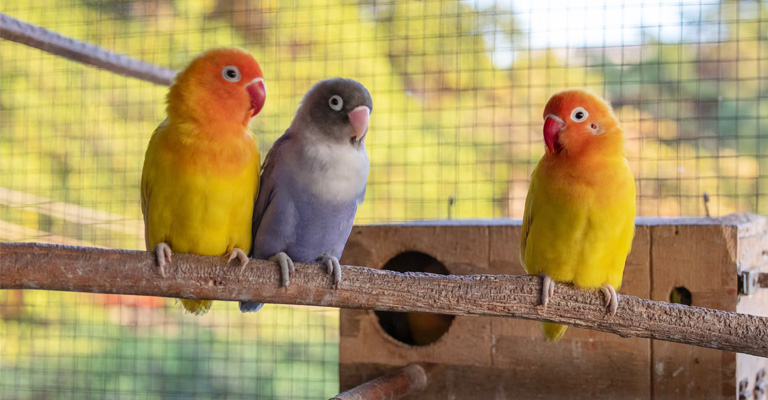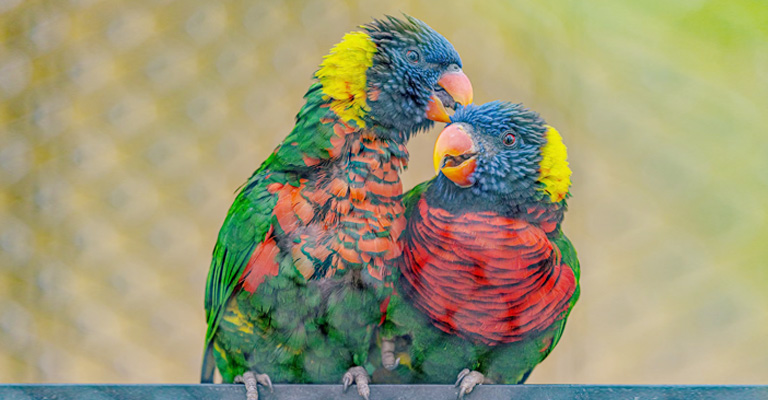Lovebirds, with their charming personalities and vibrant plumage, are popular pet birds known for their affectionate behavior and social interactions.
However, it’s not uncommon for owners to witness an intriguing yet puzzling behavior: lovebirds biting each other’s feet.
This behavior can raise questions and concerns about the well-being of these feathered companions. In this discussion, we delve into the intriguing phenomenon of lovebirds biting each other’s feet, exploring the possible motivations behind this behavior.
From playful bonding to dominance establishment and even stress-related factors, we uncover the various reasons why lovebirds engage in this activity.
Understanding the underlying causes is essential for bird owners to ensure the health and happiness of their beloved avian friends. So, let’s unravel the mystery behind why do lovebirds bite each other feet.

Why Do Lovebirds Bite Each Other Feet?
Lovebirds, like many other parrot species, may engage in various behaviors, including biting each other’s feet, for several reasons. Here are some possible explanations:
Playful Behavior
Lovebirds are highly social and playful birds. Biting each other’s feet can be a form of play and communication between them. Just like human siblings playfully wrestle, lovebirds may nip at each other’s feet in a friendly manner during their interactions.
Establishing Dominance
Lovebirds, especially in pairs or groups, establish hierarchies. Biting can be a way for them to assert dominance. A lovebird might bite another bird’s feet to establish its position within the flock or pair.
Mating Behavior
During courtship and mating, lovebirds display various behaviors. Biting can be a part of their mating ritual. Males might gently bite the female’s feet as a way of showing affection and initiating mating behaviors.
Territorial Defense
Lovebirds are known for their strong territorial instincts. If one bird feels its space is being invaded, it might resort to biting as a way to protect its territory and assert dominance within their shared living environment.
Communication of Needs
Lovebirds communicate various needs through body language. Biting feet can be a way of expressing hunger, seeking attention, or indicating a desire to move to a different location within their cage or aviary.
Stress or Anxiety
Biting can also be a response to stress or anxiety. Changes in their environment, the introduction of new birds, or alterations in their routine can trigger stress-related behaviors, including biting.
Health Issues
Sometimes, birds bite their cage mates’ feet due to underlying health problems, such as pain or discomfort. It’s essential to monitor their overall health and behavior to rule out any medical issues if biting becomes persistent or aggressive.
Understanding the context and body language of lovebirds is crucial in interpreting why they might be biting each other’s feet.
Careful observation, along with providing a stimulating and stress-free environment, can help mitigate unwanted behaviors and ensure the well-being of these social and intelligent birds.
How Can I Stop Lovebirds From Biting Each Other Feet?

Firstly, observe the situations in which the biting occurs. If it’s during playtime and seems harmless, it might not be a cause for concern. However, if the biting is aggressive or causing distress to one of the birds, intervention is necessary. Here’s how:
Separation and Observation
If the biting is excessive or aggressive, consider separating the lovebirds temporarily. This separation can give them a chance to cool off and prevent further negative interactions. Use this time to closely observe their behaviors.
Cage Size and Enrichment
Ensure that the birds have a spacious cage with plenty of toys and perches. Boredom can lead to aggressive behaviors. Providing mental and physical stimulation can reduce stress and minimize biting tendencies.
Positive Reinforcement
Use positive reinforcement techniques when they exhibit positive behaviors. Reward them with treats, praise, or affection when they are calm and not engaging in biting. This helps them associate good behavior with positive outcomes.
Training and Socialization
Spend time with each lovebird individually, reinforcing positive interactions. Additionally, gradually reintroduce them under supervision. Correct undesirable behavior with a firm but gentle ‘no’ and provide positive reinforcement when they behave well together.
Regular Veterinary Check-ups
Sometimes, aggressive behavior can be a sign of underlying health issues. Regular veterinary check-ups can rule out any medical causes for their behavior.
Consulting a Professional
If the biting behavior persists despite your efforts, consider consulting an avian behaviorist or a veterinarian specializing in birds. They can provide tailored advice and training techniques to address specific issues.
Patience and Consistency
Changing behavior takes time and consistency. Be patient and persistent in your efforts. Reinforce positive behaviors consistently and avoid reinforcing negative behaviors inadvertently.
By providing a stimulating environment, positive reinforcement, and patient training, you can work towards minimizing or stopping lovebirds from biting each other’s feet, promoting a harmonious coexistence between your feathered companions.
Why Do Love Birds Fight Each Other?

Lovebirds, known for their affectionate behaviors, can occasionally engage in conflicts with one another for various reasons. Here are some common reasons why lovebirds might fight each other:
Territorial Disputes
Lovebirds can become territorial, especially if they feel their nesting area or a favored perch is being encroached upon. This territorial behavior can lead to squabbles with their partner or other birds in their vicinity.
Competition for Resources
Lovebirds can be competitive when it comes to resources like food, water, and toys. If they perceive a shortage of these essentials, they may engage in disputes with their mate or cage companions.
Mating Aggression
During the breeding season, lovebirds may exhibit increased aggression towards their mate or other birds in the enclosure. This is often related to their hormonal changes and the desire to protect their nesting site.
Protecting Nest and Young
Lovebirds are diligent parents, and they will fiercely defend their nests and chicks. Any perceived threat to their young can lead to aggressive behaviors directed at the perceived intruder.
Jealousy
Lovebirds can be possessive and jealous. If they perceive their mate is getting too close to another bird, they may respond with jealousy and attempt to chase off the perceived rival.
Personality Differences
Individual lovebirds may have varying personalities. In some cases, personality clashes between a pair of lovebirds can lead to squabbles and disagreements.
Lack of Stimulation
Boredom or a lack of mental and physical stimulation can lead to frustration and irritability in lovebirds. They may vent their frustration through occasional conflicts with their mate or cage companions.
Understanding these reasons for lovebird conflicts can help bird owners create a more harmonious and enriching environment for their avian companions.
Providing ample space, resources, and social interactions can help reduce instances of fighting among lovebirds.
FAQs
Why do lovebirds bite each other’s feet?
Lovebirds may bite each other’s feet for various reasons. It can be a form of play, a display of dominance, part of mating behavior, territorial defense, a way to communicate needs, a reaction to stress, or an indicator of underlying health issues.
Is lovebird foot-biting behavior harmful?
In some cases, lovebirds biting each other’s feet can be harmless and a part of their natural interactions, especially if it’s playful or affectionate. However, aggressive or persistent biting can lead to harm and should be addressed to prevent injuries and stress to the birds.
How can I tell if lovebirds are playfully biting or displaying aggression?
Observing the birds’ body language is key to distinguishing playful biting from aggressive behavior. Playful biting is often accompanied by relaxed body postures, gentle nips, and vocalizations that indicate enjoyment.
Can I stop lovebirds from biting each other’s feet?
Yes, you can take steps to reduce or prevent lovebirds from biting each other’s feet. These steps include providing an enriched living environment, training, separation when necessary, positive reinforcement, regular vet check-ups, and consulting avian professionals if the behavior persists.
When should I be concerned about lovebird foot-biting behavior?
You should be concerned if the foot-biting behavior is aggressive, persistent, or causing injuries. Additionally, if the biting is accompanied by other signs of distress, such as feather plucking, changes in appetite, or lethargy, it may indicate underlying health issues that require immediate attention from a veterinarian.
Conclusion
The behavior of lovebirds biting each other’s feet is multifaceted and can be attributed to various motivations, including play, dominance, mating rituals, and territorial defense.
Understanding the context and body language of these charming birds is crucial for interpreting why they engage in this behavior.
While some biting may be harmless and a part of their natural interactions, aggressive or persistent biting may necessitate intervention, such as separation, environmental enrichment, and positive reinforcement training.
By addressing the underlying causes and ensuring a stimulating and stress-free environment, lovebird owners can help minimize foot-biting and foster a harmonious coexistence between their feathered companions, ultimately enhancing the well-being of these social and intelligent birds.